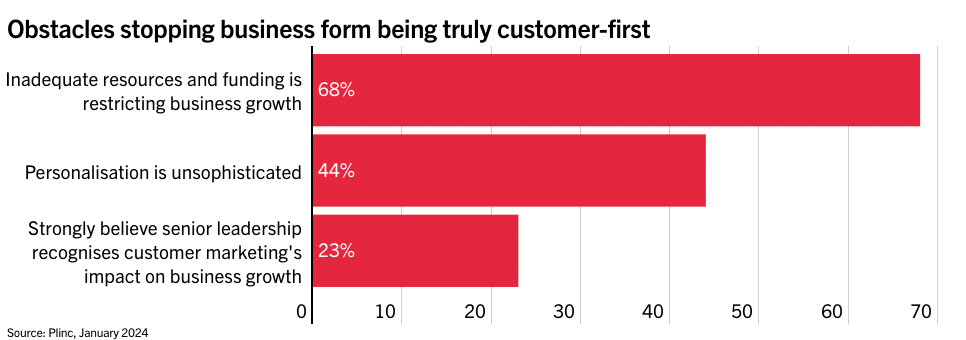
B2C marketers are behind where they should be in terms of understanding their audiences, and much of this comes down to the use of and access to data.
Research from customer data platform Plinc revealed over four in five (81%) senior marketers in UK-based B2C brands can’t easily access the customer data they need to inform campaigns, causing frustration, burdensome processes and a negative impact on results.

Nearly two-thirds (61.5%) revealed their core customer data is updated once per week or less frequently, diminishing the relevance and impact of their campaigns.
Frustrating processes add to the current stresses felt by marketers, particularly during the pitch process which leaves half of marketers (50%) burning out.
With inflation rates at a 15-year high causing business costs to soar along with the prices consumers pay, personalisation has become a lynchpin for increasing customer retention rates. Yet, disjointed and inaccessible customer data is affecting these efforts, with over two-fifths (44%) believing their personalisation is unsophisticated and impacting the effectiveness of campaigns.

Only 23% of marketing professionals strongly believe senior leadership recognises customer marketing’s impact on business growth, with ‘proving their value to protect budgets’ reported as their greatest source of stress. Inadequate resources and funding are restricting over two thirds (68%) from driving business growth, the research found.
“Ultimately, the lack of access to customer data has made the role of customer marketing fraught with uncertainties, challenges and stressors,” said Stuart Russell, Chief Strategy Officer at Plinc. “Yet, there is a way marketers can alleviate the concerns keeping them up at night.
“It starts with marketers educating businesses on the wider value of customer data. Not just for marketing activity—but for product development, customer experience initiatives, customer support and beyond. Through instilling a true ‘customer-first’ mentality throughout a business, marketers can start to optimise their campaigns whilst also demonstrating business impact.”
Of course, every (good) B2C brand cares about its customers, but that doesn’t make them customer-first. The report argued that most businesses today are customer-led.
It concluded: “If you are looking to achieve a customer-first approach, the onus should be on enabling agility. Identifying valuable insights and acting on them quickly to optimise your programs is the only way to deliver truly data-driven marketing.”




.jpg&h=334&w=500&q=100&v=20250320&c=1)


.jpg&h=334&w=500&q=100&v=20250320&c=1)


.jpg&h=334&w=500&q=100&v=20250320&c=1)


.png&h=268&w=401&q=100&v=20250320&c=1)
.jpg&h=268&w=401&q=100&v=20250320&c=1)





